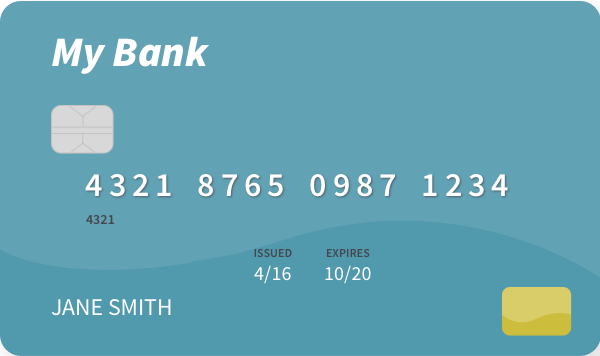WHAT IS A FINANCIAL INSTITUTION?
At the financial institution:
- If you don’t know who to talk to, just ask.
- Don’t sign anything you don’t understand.
- Ask questions until you have the answers you need.
- Ask for written information to take home and review.
Selecting the best for you
Not all financial institutions are called “banks.” Read each definition to learn more.
why use a financial institution
Benefits of using a financial institution
Safety: It’s risky to keep your money in cash. It could easily get lost, stolen, or even destroyed in an unexpected event such as a house fire. By keeping your money in a financial institution, you’ll have the peace of mind knowing your funds are safe.
Convenience: By using financial institution, you don’t have to carry large amounts of cash, but you can conveniently get cash when you want it at bank branches, ATMs, grocery stores, and many other convenient locations — even when you travel away from home.
Saves money: Many people who don’t have a bank account use check cashing stores instead. Most of these stores charge very high fees. You can usually save a lot by using a bank account with no fees.
Security: Are you worried that a bank might mismanage your money, or even go out of business? All U.S. banks have to follow federal and state laws and regulations. And at most banks, your funds are insured by the Federal Deposit Insurance Corporation, or FDIC. At most credit unions, your funds are insured by the National Credit Union Administration or NCUA. That means that if anything ever happened to the bank, your money up to $250,000 is insured or protected.
Financial future: By working with a financial institution, you’ll have financial professionals you can talk to and work with. The knowledgeable advice of these professionals can be valuable resource to help you and your family to build a better financial future.

about fdic insurance
The Federal Deposit Insurance Corporation (FDIC) preserves and promotes public confidence in the U.S. financial system by insuring deposits in financial institutions; by identifying, monitoring and addressing risks to the deposit insurance funds; and by limiting the effect on the economy and the financial system when a financial institution fails.
The FDIC insures deposits in most financial institutions in the United States. The FDIC protects depositors against the loss of their deposits if a FDIC-insured financial institution fails. FDIC insurance is backed by the full faith and credit of the United States government.
Basic FDIC insurance is $250,000 per depositor per insured financial institution. It is possible to have more than $250,000 insured by the FDIC on deposit at any one financial institution. The FDIC separately insures deposits held in different categories of legal ownership including: Individual Accounts, Joint Accounts, Revocable Trust Accounts (including Payable-on-Death [POD] accounts), and certain Retirement Accounts (such as IRAs).
The FDIC insures deposits only. It does not insure securities, mutual funds, U. S Treasury bills, bonds, notes or similar types of investments purchased through an insured financial institution.
Here is a summary of what funds are — and are not — FDIC-Insured:
| FDIC INSURED | NOT FDIC INSURED |
|---|---|
| • Checking Accounts (including money market deposit accounts). • Savings Accounts (including passbook accounts). • NOW Accounts. • Time Deposit Accounts (Certificate of Deposits). • Certain Retirement Accounts (including IRAs). | • Investments in mutual funds (stock, bond or money market mutual funds). • Annuities (underwritten by insurance companies). • Stocks, bonds, Treasury securities or other investment products, whether purchased through a bank or a broker/dealer. • Contents of safe deposit boxes. • Losses from robberies and other thefts. |
ABOUT National Credit Union Share Insurance Fund
Created by the U.S. Congress in 1970, the National Credit Union Administration is an independent federal agency that insures deposits at federally insured credit unions, protects the members who own credit unions, and charters and regulates federal credit unions.
Federally insured credit unions offer a safe place for you to save your money, with deposits insured up to at least $250,000 per individual depositor. The National Credit Union Administration (NCUA) is the independent agency that administers the National Credit Union Share Insurance Fund (NCUSIF). NCUSIF is a government-backed insurance fund for credit union deposits. Like the FDIC’s Deposit Insurance Fund, the NCUSIF is a federal insurance fund backed by the full faith and credit of the United States government and covers up to $250,000 per account holder per institution.
To learn more about credit unions, visit https://www.mycreditunion.gov/

